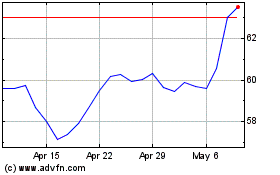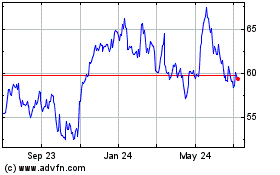By Saabira Chaudhuri
This article is being republished as part of our daily
reproduction of WSJ.com articles that also appeared in the U.S.
print edition of The Wall Street Journal (July 20, 2019).
Anheuser-Busch InBev SA agreed to sell its Australian unit to
Asahi Group Holdings Ltd., as the world's biggest brewer tries to
pare its heavy debt at a time when American beer drinkers have been
losing their taste for the stuff.
AB InBev, which makes one out of every four beers sold
world-wide, owns hundreds of brands in dozens of countries after a
global buying spree that gave it Budweiser, Stella Artois and
Corona. But those deals saddled the Belgian brewer with about $100
billion in debt; meanwhile, beer sales have slowed in the U.S. and
other major markets.
The deal announced Friday for the Australian unit, for $11.3
billion was a Plan B money raiser for the AB InBev after it yanked
its plan for an Asia IPO last week, according to people familiar
with its thinking. The company had hoped the stock offering would
raise nearly $10 billion, enabling a substantial reduction of debt.
The company cited market conditions for scrapping the listing,
while analysts and investors said the offering was priced too
high.
AB InBev shares jumped as investors welcomed the price struck
for the unit, Carlton and United Breweries, plus an indication from
the company that it was still considering an initial public
offering of its Asia businesses.
The brewer has struggled particularly in the U.S., where its
flagship Budweiser and Bud Light brands have bled share to rivals.
In response, it has snapped up craft brewers, launched
limited-editions of Bud and new flavors for Bud Light, and put more
marketing muscle behind its low-carb brew Michelob Ultra.
So far those moves haven't plugged the leak, with Bud shipments
in the U.S. continuing on a three-decade decline, according to Beer
Marketer's Insights. For the first quarter, AB InBev reported a
1.2% drop in North American volumes.
AB InBev isn't alone among brewers in suffering from changing
consumer tastes in the U.S., the world's largest beer market by
value. Big brands from Molson Coors Brewing Co. and Heineken NV
have lost share as beer drinkers choose craft varieties over
mainstream lagers or shun beer in favor of spirits and wine. But AB
InBev derives more of its profit from the U.S. than Heineken and
Carlsberg A/S, the second and third largest international beer
companies.
Beyond the U.S., AB InBev has grappled with economic disruption
in Brazil, South Africa and Argentina that has capped consumer
spending. Weaker currencies have reduced the value of sales in some
emerging markets when converted into dollars. Investors have also
questioned the company's business model, saying it is too focused
on cost-cutting and dependent on acquisitions for growth.
Against that backdrop, AB InBev has been trying to tackle its
debt, including by slashing its dividend last year and exploring
the Asia IPO.
On Friday, the company reiterated its commitment to spinning off
its Asia arm now without Carlton and United Breweries, saying it
"continues to believe in the strategic rationale" of listing a
minority stake in the division "at the right valuation."
Australia accounts for an estimated 27% of AB InBev's profit in
Asia, according to brokerage Sanford C. Bernstein.
Analysts said the exclusion of Australia, a mature beer market,
could help AB InBev woo investors to a new Asia offering that
promises higher growth, helped by countries like China, the world's
biggest beer market by volume.
The company said it would use almost all proceeds from the
Australia sale to pay down debt. Analysts said that could allow AB
InBev to hit its debt-reduction target a year ahead of schedule and
help preserve its credit rating, putting it in a better position to
make acquisitions.
AB InBev ultimately hopes to shrink it debt to about $80
billion, according to a person familiar with its thinking.
Jefferies analyst Edward Mundy suggested AB InBev could look to
buy businesses like Thai Beverage Public Co., Castel Group, a
leading brewer in Africa, and San Miguel, which is partly owned by
Kirin Holdings Co.
The Wall Street Journal reported Thursday that AB InBev,
following the IPO's cancellation, was considering selling other
assets, including its businesses in Australia, South Korea,
Guatemala and Honduras. The Journal reported that Japan's Asahi in
May expressed interest in buying the Australia business, and that
AB InBev was approached the same month by private-equity firm KKR
& Co. about buying some Asian assets.
For Asahi, the deal represents its latest move to expand
overseas. In 2016, the company bought European premium brands
Peroni and Grolsch from AB InBev for about $2.9 billion. Japan's
beer market has been in decline since the early 2000s, according to
Jefferies, and Japanese brewers have shown a willingness to pay
high prices to secure a foothold in international markets.
The deal announced Friday will help Asahi build on its diverse
footprint in Australia, which includes local rights to the
Schweppes soft-drinks brand and Independent Liquor, which makes
ready-to-drink alcoholic beverages. Asahi also sells Asahi Super
Dry and local craft brands like Cricketers Arms.
The Japanese company will gain the rights to market AB InBev's
global brands in Australia, as well as ownership of local beer
brands including Victoria Bitter and Pirate Life. Asahi also gets
local rights to the Foster's brand, which is owned outside
Australia by Heineken and Molson Coors.
The deal is expected to close by the first quarter of next
year.
Write to Saabira Chaudhuri at saabira.chaudhuri@wsj.com
(END) Dow Jones Newswires
July 20, 2019 02:47 ET (06:47 GMT)
Copyright (c) 2019 Dow Jones & Company, Inc.
Anheuser Busch Inbev SA NV (NYSE:BUD)
Historical Stock Chart
From Mar 2024 to Apr 2024

Anheuser Busch Inbev SA NV (NYSE:BUD)
Historical Stock Chart
From Apr 2023 to Apr 2024
